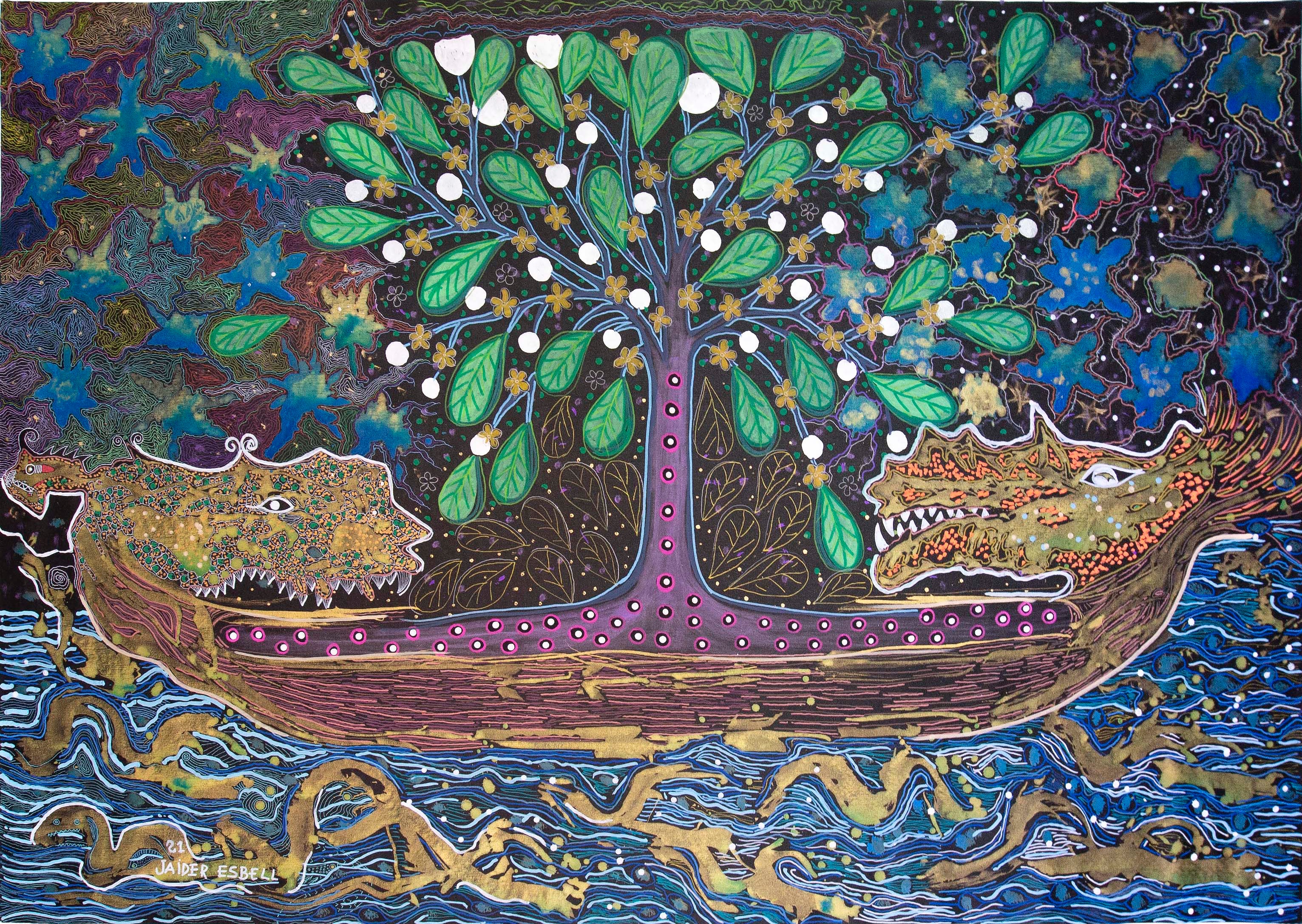Vivos e aqui
Main Article Content
Abstract
Based on works by Mário de Andrade, Jaider Esbell and Denilson Baniwa, the article analyzes how different conceptions of time are experienced ethically and politically by São Paulo’s modernism, as well as by some indigenous artists who currently carry out its criticism and revenge. In the text, the rhapsody Macunaíma, the hero without any character is analyzed chrono-politically and confronted with the narratives of Jaider Esbell around his grandfather, Makunaima, as well as with allegories and performances by Denilson Baniwa. The ideas of alochronism (Johannes Fabian), spiral time (Leda Maria Martins) and the temporal dimension of the warrior cannibalism complex (Eduardo Viveiros de Castro) are intertwined
Downloads
Article Details

This work is licensed under a Creative Commons Attribution-NonCommercial 4.0 International License.
Authors who publish in this journal agree to the following terms:
Authors maintain the copyright and grant the journal the right of first publication, the work being simultaneously licensed under the Creative Commons Attribution License which allows the sharing of the work with recognition of the authorship of the work and initial publication in this journal.
Authors are authorized to take additional contracts separately, for non-exclusive distribution of the version of the work published in this journal (eg publish in institutional repository or as a book chapter), with acknowledgment of authorship and initial publication in this journal.
Authors are allowed and encouraged to publish and distribute their work online (eg in institutional repositories or on their personal page) at any point before or during the editorial process, as this can generate productive changes as well as increase the impact and the citation of the published work.
References
ANDRADE, Mário de. Assim falou o papa do futurismo: como Mario de Andrade define a escola que chefia. A Noite. Rio de Janeiro, 12 de dezembro de 1925.
ANDRADE, Mário de. Macunaíma: o herói sem nenhum caráter. Belo Horizonte/Rio de Janeiro: Villa Rica, 1976.
ANDRADE, Mário de. Prefácio interessantíssimo. In: Pauliceia Desvairada. São Paulo: São Paulo: EDUSP, 2003.
CASTRO, Eduardo Viveiros de. A inconstância da alma selvagem. São Paulo: Cosac Naify, 2011.
CLASTRES, Pierre. Arqueologia da violência: ensaio de antropologia política. São Paulo: editora Brasiliense, 1980.
CLIFFORD, J., MARCUS, G. E (orgs). Writing Culture: The Poetics and Politics of Ethnography. Berkeley: University of California Press, 1986.
DUARTE, Pedro. A palavra modernista. Rio de Janeiro: Casa da Palavra e PUC Rio, 2014.
ESBELL, Jaider. Makunaima, o meu avô em mim! Iluminuras, Porto Alegre, v. 19, n. 46, p. 11-39, jan/jul, 2018.
FABIAN, Johannes. O tempo e o outro: como a antropologia estabelece seu objeto. Petrópolis: Vozes, 2013.
GONÇALVES, José Reginaldo dos Santos. A retórica da perda: os discursos do patrimônio cultural no Brasil. Rio de Janeiro: Editora UFRJ; IPHAN, 1996.
Mapa da Desigualdade (2020). Disponível em: https://casafluminense.org.br/ mapa-da- desigualdade/#1. Acessado em 20 de dezembro de 2020.
MARTINS, Leda. Performances do tempo espiralar. In: ARBEX, Márcia; RAVETTI, Graciela (orgs). Performance, exílio, fronteiras: errâncias territoriais e textuais. Belo Horizonte: Departamento de Letras Românicas, Faculdade de Letras/UFMG: Poslit, 2002.
MARTINS, Leda. Tempo em performance. Palestra proferida em 17 de dezembro de 2020. Disponível em: https://www.youtube.com/watch? v=ShvhGTCYzw8&t=889s. Acessado em 20 de dezembro de 2020.
MAHMOOD, Saba. Teoria feminista, agência e sujeito liberatório: algumas reflexões sobre o revivalismo islâmico no Egipto. Etnográfica, 23(1), 2019
SPIVAK, Gayatri Chakravorty. (1988) Pode o subalterno falar? Belo Horizonte: Editora UFMG, 2010.
TAUREPANG; MACUXI; WAPICHANA; ARIEL, MARCELO; ANDRADE, Mário de; GOLDEMBERG, Deborah; KOCH-GRUNBERG, Theodor; RENNÓ, Iara. Makaunaimã: o mito através do tempo. São Paulo: Elefante, 2019.

